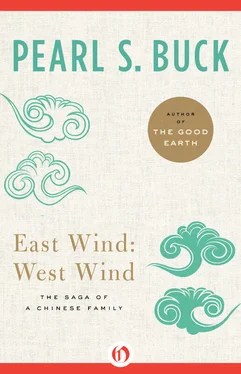I could not understand why my brother refused to marry. The first concubine laughed when she heard of it and cried,
“In Peking it must be he has found a beautiful Manchu!”
But I did not believe my brother loved anything except his books.
I grew up therefore alone in the courtyards of the women.
There were of course the children of the concubines; but I knew my mother considered them only as so many mouths to be fed when she gave out the daily rations of rice and oil and salt, and she paid them no attention beyond ordering the necessary yards of plain blue cotton cloth for their garments.
As for the concubines, they were at heart only ignorant women, always quarreling and mortally jealous of one another’s place in the affections of my father. They had caught my father’s fancy at first through a prettiness which faded like flowers plucked in spring, and my father’s favor ceased when their brief beauty was gone. But they never seemed to be able to perceive that they were no longer beautiful, and for days before his coming they would busy themselves with furbishing up their jewels and gowns. My father gave them money on feast days and when he was lucky at his gambling, but they spent it foolishly on sweetmeats and on the wines they loved; and then having nothing before his coming they borrowed money of the servants to buy new shoes and hair ornaments. The servants were contemptuous when they saw the concubines had lost my father’s favor, and drove hard bargains with them.
The eldest concubine, a fat, pudgy creature, whose tiny features were sunken in the mountains of her cheeks, was notable for nothing except her small and beautiful hands, in which she took the greatest pride. She washed them in oils and stained the palms rose-red, and the smooth, oval nails she painted vermilion. Then she scented them with a heavy magnolia perfume.
Sometimes my mother would weary of this woman’s empty vanity and a little maliciously would bid her do some coarse washing or sewing. The fat Second Lady dared not disobey, but she whined and complained secretly to the other concubines that my mother was jealous of her and wished to spoil her beauty for my father. This she said, nursing her hands the while and examining them with the greatest care to see if the delicate skin were at all bruised or thickened. I could not bear to touch her hands; they were hot and soft and melted in one’s grasp.
My father had long since ceased to care for this woman, but he gave her money when he came and spent a night in her apartment, lest she cry in a loud voice in the courts and tease him with her reproaches. She had, moreover, two sons and thus was entitled to some attention.
Her sons were fat and exactly resembled their mother, and I do not bring them to mind except as eating and drinking continually. They ate fully at the table with the others, yet afterwards they would creep away into the servants’ courtyard and quarrel with the servants for the left-over bits. They went about always with great cunning, fearing my mother, who hated above all else greed for food. She herself never ate more than a bowl of dry rice with a bit of salted fish or a thin slice of cold fowl and a sip of scented tea.
I do not remember more about the Second Lady except that she was always much afraid of dying. She ate many sweet oily sesame cakes and, when she fell ill, lay groaning in great terror. Then she would call in the Buddhist priests and promise her pearl hair ornaments to the temple if the gods would make her well. But when she was well again she continued to eat cakes and feigned to forget the promise.
The second concubine, the Third Lady, was a dim woman, who spoke seldom and took little interest in the family life. She had five children, all girls except the youngest; and this had weakened her spirit and made her disconsolate. For the girls she cared nothing. They were neglected and held little higher than the slaves we bought for service. She spent her time in a sunny corner of the courtyard nursing the son, a heavy, sallow child, three years old and still unable to talk or walk. He cried a great deal and was forever dragging at her long, flabby breasts.
The concubine I liked best was the third, a little dancing girl from Soochow. Her birth name was La-may, and she was as pretty as the la-may flower itself, which puts out its pale gold blossoms from leafless branches in early spring. She was like them, dainty and pale and golden. She used to put no paint on her cheeks as others did, but only an emphasis of black on her narrow eyebrows and a touch of vermilion on her lower lip. We saw very little of her at first, for my father was proud of her beauty and took her with him everywhere.
The last year before my marriage she had been at home, however, waiting for her son to be born. He was a lovely boy, chubby and handsome, and she took him and laid him in his father’s arms. Thus she repaid what he had given her of jewels and affection.
Before the child’s birth the Fourth Lady had been in a continual mood of high excitement and tinkling laughter. Everywhere she was praised for her beauty; and indeed, I have never seen a loveliness to surpass hers. She wore jade-green satins and black velvet, with jade in her exquisite ears, and she scorned us all a little in spite of her careless generosity with the cakes and sweetmeats given her at the feasts she attended nightly with my father. She seemed to eat almost nothing herself — a sesame cake in the morning, after my father had left her, and at noon half a bowl of rice with a bit of bamboo shoot or a thin slice of salted duck. She loved foreign wines and coaxed my father to buy her a pale yellow liquid with silver-pointed bubbles darting upward from the bottom. It made her laugh and become very talkative and her eyes sparkle like black crystals. Then she amused my father exceedingly, and he would bid her dance and sing for him.
But when my father feasted, my mother sat in her own apartment reading the stately sayings of Confucius. As for me, when I was a young girl I often wondered at those feast nights and longed to peep, as I once had when I sought my brother, between the carved crevices of the moon-gate into the men’s apartments. But my mother would never allow it, I knew, and I was ashamed to deceive her.
One night, however — I am filled with shame now at my unfilial disobedience! — I crept secretly through the blackness of a moonless summer night and gazed again through the gate and saw into my father’s apartments. I do not know why I did it — I no longer thought of my brother. Some strange fullness of vague desire had made me restless throughout the long hot day, and when the night came, filled with warmth and dusk and the thick scent of lotus flowers, the quietness of our women’s rooms seemed a thing dead of itself. My heart beat hard as I gazed. The doors were flung wide and the light from a hundred lanterns streamed out into the hot, still air. Within I saw men sitting at square tables eating and drinking and servants hurrying back and forth with food. Behind each man’s chair stood the vine-slender figure of a girl. But seated at my father’s side, the only woman at the table, was La-may. I could see her quite clearly, her face smiling a little, shining like a wax-petaled flower, as it turned to my father. She said something in a low voice, scarcely moving her lips, and a roar of laughter went up from the men. Her smile was unchanged, slight, subtle, and she did not laugh.
This time my mother herself discovered me. She seldom left the house even to walk in the courts, but the heat of the night had driven her forth, and her sharp eyes discerned me immediately. She commanded me to retire at once to my room and following me there she slapped the palms of my hands sharply with her folded bamboo fan and asked me scornfully if I desired to see harlots at their work. I was ashamed and wept.
Читать дальше











